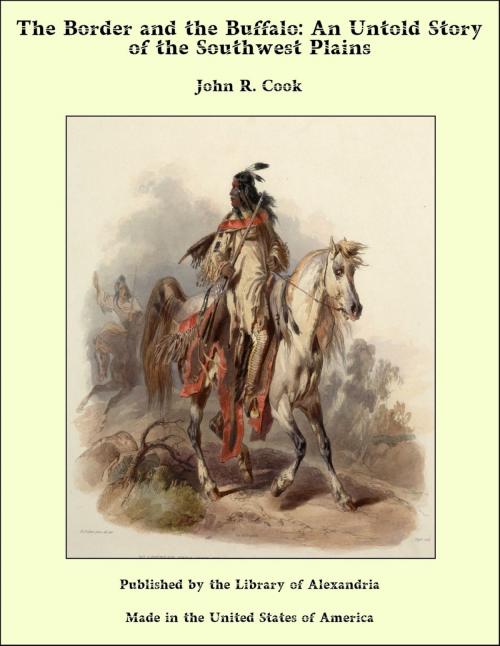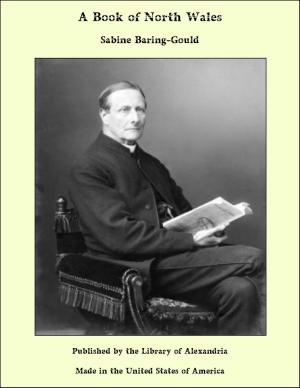The Border and the Buffalo: An Untold Story of the Southwest Plains
Nonfiction, Religion & Spirituality, New Age, History, Fiction & Literature| Author: | John R. Cook | ISBN: | 9781465607676 |
| Publisher: | Library of Alexandria | Publication: | March 8, 2015 |
| Imprint: | Language: | English |
| Author: | John R. Cook |
| ISBN: | 9781465607676 |
| Publisher: | Library of Alexandria |
| Publication: | March 8, 2015 |
| Imprint: | |
| Language: | English |
I was born in Mount Gilead, Ohio, on the 19th of December, 1844. Father moved his family to Lawrence, Kansas, in the spring of 1857. That summer we occupied the historical log cabin that J. H. Lane and Gaius Jenkins had trouble over,—resulting in the tragic death of the latter. Shortly prior to the killing of Jenkins, we moved to Peru, Indiana, where we remained until the latter part of March, 1861, when the family returned to Kansas. Myself and oldest brother traveled overland by team and wagon. We had three head of horses. We left the State line of Indiana at Danville, and crossed the Mississippi to Hannibal, Missouri, the day that General Beauregard fired on Fort Sumter. And the War of the Rebellion was on. As we were driving up a street, in the evening of that great day, an old gentleman standing at the gate in front of a cottage hailed us and asked where we were going. "To Kansas," was brother's reply. The old gentleman walked out to where we had stopped, and said: "Boys, you are goin' into a peck of trouble. Gineral Buregard cannonaded Fort Sumter to-day, and is at it yit. Boys, I'd turn round and go back to whar ye come from." Brother said: "No, Uncle, we could never think of such a thing. Our father and mother are now at Lawrence, Kansas, and we must go to them." He replied: "That place you are going to will be a dangerous place. There has already been a power of trouble out thar whar you are goin', and thar's bound to be a heap more; and all over the nigger, too. I own nineteen of 'em, but if it would stop the spillin' of blood I would free every one of 'em to-night." This old gentleman had a kind, pleasant-looking face, wore the typical planter's hat, and seemed to take a fatherly interest in us; directed us to a certain farm house on our road where we could get accommodations for the night. And we passed on, having for the first time in our lives seen and talked with the owner of human chattels. Some neighbors came to the house where we stayed that night, and in earnest fireside talk conveyed the idea that there would be no war; for, said they, when the North finds out that we are in earnest they will not fight us. My brother, being four years older than I, took part in the evening's talk, and told them that it was but fair to leave the negro out of the question, and to consider the Union as our forefathers left it to us, and that he did not think that twenty-odd millions of people would consent to have the Union of our forefathers dismembered. The next day, as we were passing through a densely timbered region, an old negro came out from behind a large tree near the wagon-track. His wool was white as snow; his head was bared, and, holding in one hand an apology for a hat, he gave us a courteous bow, and said: "Please, Mars, is we gwine to be free?" (Their underground telegraph was already bringing word from South Carolina to Missouri.) My brother, being more diplomatic than I could or would have been at the time, said to him, "Why, you surprise me, Grandpop. You look fat and sleek and I know you have more freedom this minute than I have."
I was born in Mount Gilead, Ohio, on the 19th of December, 1844. Father moved his family to Lawrence, Kansas, in the spring of 1857. That summer we occupied the historical log cabin that J. H. Lane and Gaius Jenkins had trouble over,—resulting in the tragic death of the latter. Shortly prior to the killing of Jenkins, we moved to Peru, Indiana, where we remained until the latter part of March, 1861, when the family returned to Kansas. Myself and oldest brother traveled overland by team and wagon. We had three head of horses. We left the State line of Indiana at Danville, and crossed the Mississippi to Hannibal, Missouri, the day that General Beauregard fired on Fort Sumter. And the War of the Rebellion was on. As we were driving up a street, in the evening of that great day, an old gentleman standing at the gate in front of a cottage hailed us and asked where we were going. "To Kansas," was brother's reply. The old gentleman walked out to where we had stopped, and said: "Boys, you are goin' into a peck of trouble. Gineral Buregard cannonaded Fort Sumter to-day, and is at it yit. Boys, I'd turn round and go back to whar ye come from." Brother said: "No, Uncle, we could never think of such a thing. Our father and mother are now at Lawrence, Kansas, and we must go to them." He replied: "That place you are going to will be a dangerous place. There has already been a power of trouble out thar whar you are goin', and thar's bound to be a heap more; and all over the nigger, too. I own nineteen of 'em, but if it would stop the spillin' of blood I would free every one of 'em to-night." This old gentleman had a kind, pleasant-looking face, wore the typical planter's hat, and seemed to take a fatherly interest in us; directed us to a certain farm house on our road where we could get accommodations for the night. And we passed on, having for the first time in our lives seen and talked with the owner of human chattels. Some neighbors came to the house where we stayed that night, and in earnest fireside talk conveyed the idea that there would be no war; for, said they, when the North finds out that we are in earnest they will not fight us. My brother, being four years older than I, took part in the evening's talk, and told them that it was but fair to leave the negro out of the question, and to consider the Union as our forefathers left it to us, and that he did not think that twenty-odd millions of people would consent to have the Union of our forefathers dismembered. The next day, as we were passing through a densely timbered region, an old negro came out from behind a large tree near the wagon-track. His wool was white as snow; his head was bared, and, holding in one hand an apology for a hat, he gave us a courteous bow, and said: "Please, Mars, is we gwine to be free?" (Their underground telegraph was already bringing word from South Carolina to Missouri.) My brother, being more diplomatic than I could or would have been at the time, said to him, "Why, you surprise me, Grandpop. You look fat and sleek and I know you have more freedom this minute than I have."















